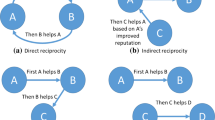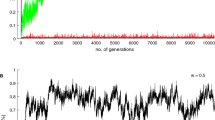Abstract
Cooperation has long been an enigma in the life and social sciences. A possible explanation for the phenomenon is the recently developed idea of strong reciprocity in which agents altruistically reward those that cooperate and altruistically punish those that do not. The acts are altruistic in the sense that when agents punish or reward they incur a cost but receive no material benefit. Both experimentalists and modelers have focused primarily on third-party altruistic punishment mechanisms yet rarely discuss how they establish a cost for punishing. In this study I used agent-based modelling to test the ability of altruistic punishment to elicit fair allocations in a simulated ultimatum game. In particular I simulated agents with the ability to punish neighbors whose offers were deemed too low while systematically varying the ratio of costs between punisher and punishee. Despite several studies in which strong reciprocity is shown to induce cooperation, altruistic punishment failed to evolve fair allocations in these simulations. However, outcomes were highly dependant on the spatial structure of agents in the simulations and fair allocations did evolve in a linearly structured population even in the absence of punishment. As the number of immediate neighbors increased, mean offers fell but still remained significantly greater than that predicted by standard economic theory. Only when social structure was removed, and agents could interact with any other agent in the population, did offers in the simulated ultimatum game match theoretical expectations.
Similar content being viewed by others
References
Anderies JM, Janssen MA, Ostrom E (2004) A framework to analyze the robustness of social-ecological systems from an institutional perspective. Ecol Soc 9(1):18–34
Andreoni J, Harbaugh W, Vesterlund L (2003) The carrot or the stick: rewards, punishments, and cooperation. Am Econ Rev 93(3):893–902
Barrett S (2003a) Creating incentives for cooperation: strategic choices. In: Kaul I, Conceição P, Le Goulven K, Mendoza RU (eds) Providing global public goods. Oxford University Press, New York, pp 308–328
Barrett S (2003b) Environment and statecraft: the strategy of environmental treaty-making. Oxford University Press, Oxford
Barrett S (2005) The theory of international environmental agreements. In: Maeler K-G, Vincent JR (eds) Economywide and international environmental issues. Handbook of environmental economics, vol 3. Elsevier, Amsterdam, pp 1457–1516
Bowles S, Gintis H (2004) The evolution of strong reciprocity: cooperation in heterogeneous populations. Theor Popul Biol 65(1):17–28
Boyd R, Gintis H, Bowles S, Richerson PJ (2003) The evolution of altruistic punishment. Proc Natl Acad Sci USA 100(6):3531–3535
Brandt H, Hauert C, Sigmund K (2003) Punishment and reputation in spatial public goods games. Proc R Soc Lond Ser B—Biol Sci 270(1519):1099–1104
Brandt H, Hauert C, Sigmund K (2006) Punishing and abstaining for public goods. Proc Nat Acad Sci USA 103(2):495–497
Casari M (2005) On the design of peer punishment experiments. Exp Econ 8(2):107–115
Dietz T, Ostrom E, Stern PC (2003) The struggle to govern the commons. Science 302(5652):1907–1912
Fehr E, Fischbacher U (2003) The nature of human altruism. Nature 425(6960):785–791
Fehr E, Fischbacher U (2004) Third-party punishment and social norms. Evol Hum Behav 25(2):63–87
Fehr E, Gächter S (2000) Cooperation and punishment in public goods experiments. Am Econ Rev 90(4):980–994
Fehr E, Gächter S (2002) Altruistic punishment in humans. Nature 415(6868):137–140
Fehr E, Rockenbach B (2003) Detrimental effects of sanctions on human altruism. Nature 422(6928):137–140
Fehr E, Fischbacher U, Gächter S (2002) Strong reciprocity, human cooperation, and the enforcement of social norms. Hum Natl Interdiscipl Biosoc Perspect 13(1):1–25
Fowler JH (2005) Altruistic punishment and the origin of cooperation. Proc Natl Acad Sci USA 102(19):7047–7049
Gardner A, West SA (2004) Cooperation and punishment, especially in humans. Am Nat 164(6):753–764
Gintis H (2000) Strong reciprocity and human sociality. J Theor Biol 206(2):169–179
Goodnight CJ (2005) Multilevel selection: the evolution of cooperation in non-kin groups. Popul Ecol 47(1):3–12
Gürerk O, Irlenbusch B, Rockenbach B (2006) The competitive advantage of sanctioning institutions. Science 312(5770):108–111
Hamilton WD (1964) Genetical evolution of social behaviour 1 & 2. J Theor Biol 7(1):1–52
Henrich J, Boyd R (2001) Why people punish defectors—weak conformist transmission can stabilize costly enforcement of norms in cooperative dilemmas. J Theor Biol 208(1):79–89
Ifti M, Killingback T, Doebelic M (2004) Effects of neighbourhood size and connectivity on the spatial continuous prisoner’s dilemma. J Theor Biol 231(1):97–106
Jaffe K (2004) Altruism, altruistic punishment and social investment. Acta Biotheor 52(3):155–172
Killingback T, Doebeli M (1996) Spatial evolutionary game theory: Hawks and Doves revisited. Proc R Soc Lond Ser B: Biol Sci 263(1374):1135–1144
Killingback T, Doebeli M (2002) The continuous prisoner’s dilemma and the evolution of cooperation through reciprocal altruism with variable investment. Am Natl 160(4):421–438
Killingback T, Studer E (2001) Spatial ultimatum games, collaborations and the evolution of fairness. Proc R Soc Lond Ser B: Biol Sci 268(1478):1797–1801
Masclet D, Noussair C, Tucker S, Villeval MC (2003) Monetary and nonmonetary punishment in the voluntary contributions mechanism. Am Econ Rev 93(1):366–380
Molm LD (1994) Is punishment effective–coercive strategies in social-exchange. Soc Psychol Q 57(2):75–94
Nowak MA, May RM (1992) Evolutionary games and spatial chaos. Nature 359(6398):826–829
Nowak MA, Sigmund K (1998) Evolution of indirect reciprocity by image scoring. Nature 393(6685):573–577
Nowak MA, Sigmund K (2005) Evolution of indirect reciprocity. Nature 437:1291–1298
Nowak MA, Page KM, Sigmund K (2000) Fairness versus reason in the ultimatum game. Science 289(5485):1773–1775
Nowak MA, Bonhoeffer S, May RM (1994) Spatial games and the maintenance of cooperation. Proc Natl Acad Sci USA 91:4877–4881
Olson M (1965) The logic of collective action: public goods and the theory of groups. Schocken Books, New York
Ostrom E, Walker J, Gardner R (1992) Covenants with and without a sword—self-governance is possible. Am Polit Sci Rev 86(2):404–417
Ostrom E, Gardner R, Walker J (1994) Rules, games, and common-pool resources. University of Michigan Press, Ann Arbor
Page KM, Nowak MA, Sigmund K (2000) The spatial ultimatum game. Proc R Soc Lond Ser B: Biol Sci 267(1458):2177–2182
Riolo RL, Cohen MD, Axelrod R (2001) Evolution of cooperation without reciprocity. Nature 414(6862):441–443
Roth AE, Prasnikar V, Okunofujiwara M, Zamir S (1991) Bargaining and market behavior in Jerusalem, Ljubljana, Pittsburgh, and Tokyo—an experimental study. Am Econ Rev 81(5):1068–1095
Rothstein SI, Pierotti R (1988) Distinctions among reciprocal altruism, kin selection, and cooperation and a model for the initial evolution of beneficent behavior. Ethol Sociobiol 9(2–4):189–209
Sandler T (1992) Collective action: theory and applications. The University of Michigan Press, Ann Arbor
Shinada M, Yamagishi T, Ohmura Y (2004) False friends are worse than bitter enemies: altruistic punishment of in-group members. Evol Hum Behav 25(6):379–393
Trivers RL (1971) Evolution of reciprocal altruism. Q Rev Biol 46(1):35–57
Wagner UJ (2001) The design of stable international environmental agreements: economic theory and political economy. J Econ Surv 15(3):377–411
Wilson EO (2005) Kin selection as the key to altruism: its rise and fall. Soc Res 72(1):159–166
Wilson DS, Sober E (1994) Re-introducing group selection to the human behavioral sciences. Behav Brain Sci 17:585–654
Author information
Authors and Affiliations
Corresponding author
Rights and permissions
About this article
Cite this article
Shutters, S.T. Strong reciprocity, social structure, and the evolution of fair allocations in a simulated ultimatum game. Comput Math Organ Theory 15, 64–77 (2009). https://doi.org/10.1007/s10588-008-9053-z
Published:
Issue Date:
DOI: https://doi.org/10.1007/s10588-008-9053-z




